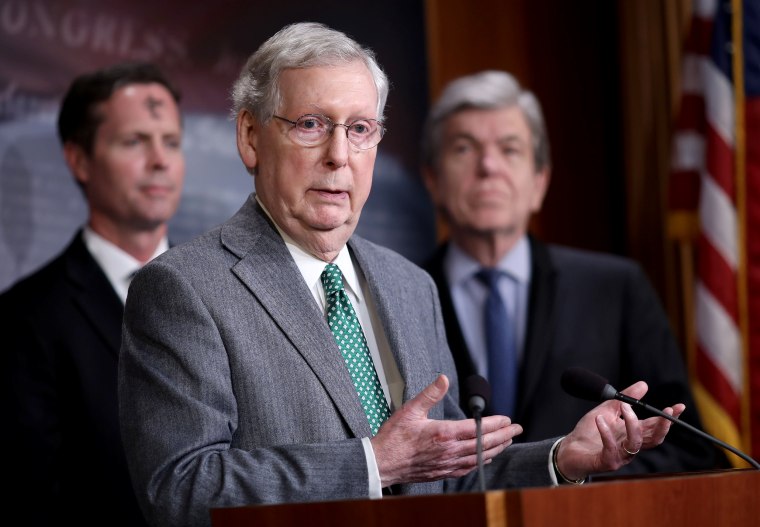WASHINGTON — The Senate plans to vote Thursday on a resolution to reverse President Donald Trump’s emergency declaration on border security, Senate Majority Leader Mitch McConnell, R-Ky., said Tuesday.
“It is no secret that the use of the national emergency law has generated a good deal of discussion," McConnell said at a press conference following a closed-door lunch with the Senate GOP Conference. "It’ll all come to a head on Thursday."
As of last week, it appeared that the House-passed resolution would also be approved by the GOP-controlled Senate because enough Republicans had signaled that they would join Democrats to vote in favor of the measure.
Trump is then expected to veto the resolution, which is not expected to receive enough support in Congress to overturn that veto.
McConnell also confirmed Tuesday that Senate Republicans are exploring ways to reform the National Emergencies Act.
“There’s a lot of discomfort with the law — not that the president doesn’t have the authority to do what he is doing," he said. "I think most of my members believe this is not a constitutional issue in that sense, but rather — is this grant of authority to any president, not just this one, any president — was it too broad back in the ’70s when it was passed?"
McConnell added that while they’re discussing altering the law, any changes would apply to future questions, and not to the current situation.
GOP support is building around legislation crafted by Sen. Mike Lee, R-Utah, which reportedly would force Congress to approve any future national emergency declaration by the president within 30 days before it automatically expires.
“I think the message is most of us want to be supportive of the president because you know, previous Congresses have provided him with this tool. He’s doing what is legal, but it’s put us in a position of reviewing the 1976 Act,” Sen. Mike Rounds, R-S.D., said Tuesday.
Sen. Lindsey Graham, R-S.C, and Rounds said that Sen. Ron Johnson, R-Wis., has also pitched passing a much softer rebuke to the president through a non-binding “sense of the Senate resolution” that would simply state the chamber’s disapproval of any president invoking the law on issues they personally deem to be national emergencies. There is currently no timeline on when the Senate could take up reform legislation, but senators assume it could happen as early as after their March recess next week.
Trump is expected to visit Capitol Hill on Thursday to attend the annual Friends of Ireland luncheon.
As of last week, at least four Senate Republicans were expected to vote to support the resolution, including Sens. Rand Paul of Kentucky, Thom Tillis of North Carolina, Lisa Murkowski of Alaska and Susan Collins of Maine. McConnell conceded that the measure would pass in the upper chamber.
Some concerned senators are starting to feel the heat from the White House and will oppose the resolution, Paul told reporters.
“Well, they’re being beaten up right now, so if you see anybody that’s got blood dripping out of their ear they may be changing,” he said. “I don’t know, there’s still a significant number [against it], but there’s a lot of people being bruised and beleaguered, so we’ll see.”
The House passed the resolution late last month in a 245-182 vote, with 13 Republicans voting in favor and as a result of the National Emergencies Act. The Senate was required by law to take it up within 18 days of that vote.
Earlier this month, McConnell wouldn't definitively say whether he thought the president's decision was legal.
"Well, we're in the process of weighing that," McConnell said then. "The lawyer was there to make his argument, there were some counter arguments. I haven't reached a total conclusion ... but we had some real serious lawyers in there discussing that very issue."



